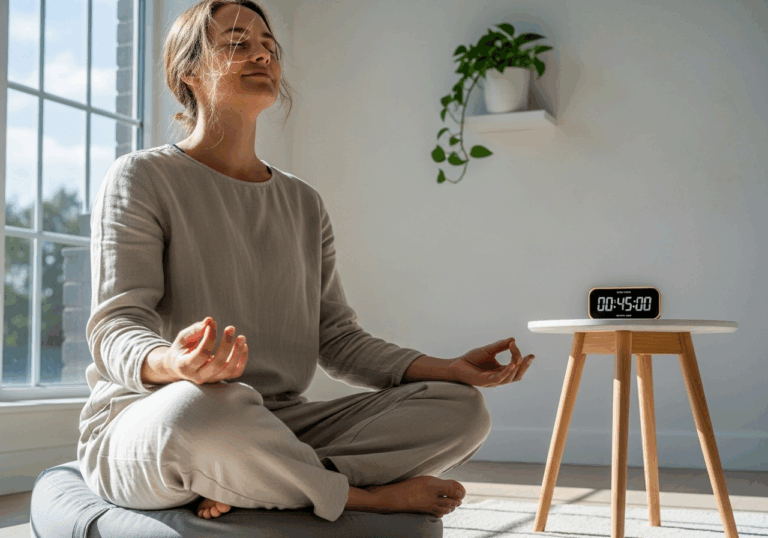Science-Backed Tips
Boost Your Heart Health with Breathing Techniques
15 minutes of daily resonance breathing can lower stress by 25%
📊 Did you know?
💡 Why It Matters
1️⃣
Regular resonance breathing practice can enhance parasympathetic function, leading to better stress management.
2️⃣
Improved HRV is associated with lower risks of cardiovascular diseases and better overall health.
3️⃣
Lower perceived stress can lead to improved quality of life and emotional wellbeing.
✅ Try These Micro-Tips
🎯
Practice resonance breathing for 15 minutes daily to enhance HRV.
🎯
Incorporate breathing exercises into your morning routine for consistent benefits.
🎯
Track your stress levels weekly to monitor improvements.
🎯
Consider joining a guided breathing session once a week for additional support.
📚 The study
The results were striking, revealing a significant increase in HRV metrics alongside an impressive ~25% reduction in subjective stress levels.
This is crucial because regular practice of resonance breathing not only enhances parasympathetic function but also plays a vital role in stress management.
Improved HRV is linked to lower risks of cardiovascular diseases, promoting better overall health.
Furthermore, a decrease in perceived stress can lead to enhanced quality of life and emotional well-being.
By incorporating just 15 minutes of resonance breathing into your daily routine, you can stabilize your mood and improve your emotional resilience.
This study highlights the transformative potential of simple breathing techniques, making it clear that investing time in your breath can yield profound benefits for both mental and physical health.
❓ Frequently Asked Questions ❓
Learn more
What is resonance breathing?
Resonance breathing is a technique that involves breathing at a specific rate, typically around 6 breaths per minute. This practice aims to enhance heart rate variability (HRV) and promote relaxation through improved vagal tone.
How long should I practice resonance breathing each day?
It is recommended to practice resonance breathing for 15 minutes daily. Consistent practice over time can lead to significant improvements in stress management and emotional stability.
What are the benefits of resonance breathing?
Resonance breathing can significantly boost heart rate variability (HRV) and lower perceived stress levels by approximately 25%. These benefits contribute to enhanced parasympathetic function and improved overall emotional well-being.
How does resonance breathing affect heart rate variability (HRV)?
Regular practice of resonance breathing has been shown to significantly increase HRV metrics. Higher HRV is associated with better stress management and lower risks of cardiovascular diseases.
Can resonance breathing help with mood stabilization?
Yes, resonance breathing can help stabilize mood by enhancing vagal tone. This leads to improved emotional regulation and a reduction in perceived stress.
How quickly can I expect to see results from resonance breathing?
Participants in studies have reported a significant drop in perceived stress scores after just 4 weeks of daily resonance breathing practice. Consistent practice is key to experiencing these benefits.
Is it necessary to join a guided session for resonance breathing?
While it is not necessary to join a guided session, participating in one can provide additional support and structure. Many find that guided sessions enhance their practice and help maintain consistency.
How can I incorporate resonance breathing into my daily routine?
You can easily incorporate resonance breathing into your morning routine by setting aside 15 minutes for the practice. This consistent scheduling can help you reap the long-term benefits of improved HRV and reduced stress.
What should I track to monitor my progress with resonance breathing?
Tracking your perceived stress levels weekly can help you monitor improvements over time. This self-assessment can provide motivation and insight into the effectiveness of your practice.
Are there any risks associated with resonance breathing?
Resonance breathing is generally considered safe for most individuals, but those with specific health conditions should consult a healthcare professional before starting. As with any new practice, it’s important to listen to your body and adjust as needed.





